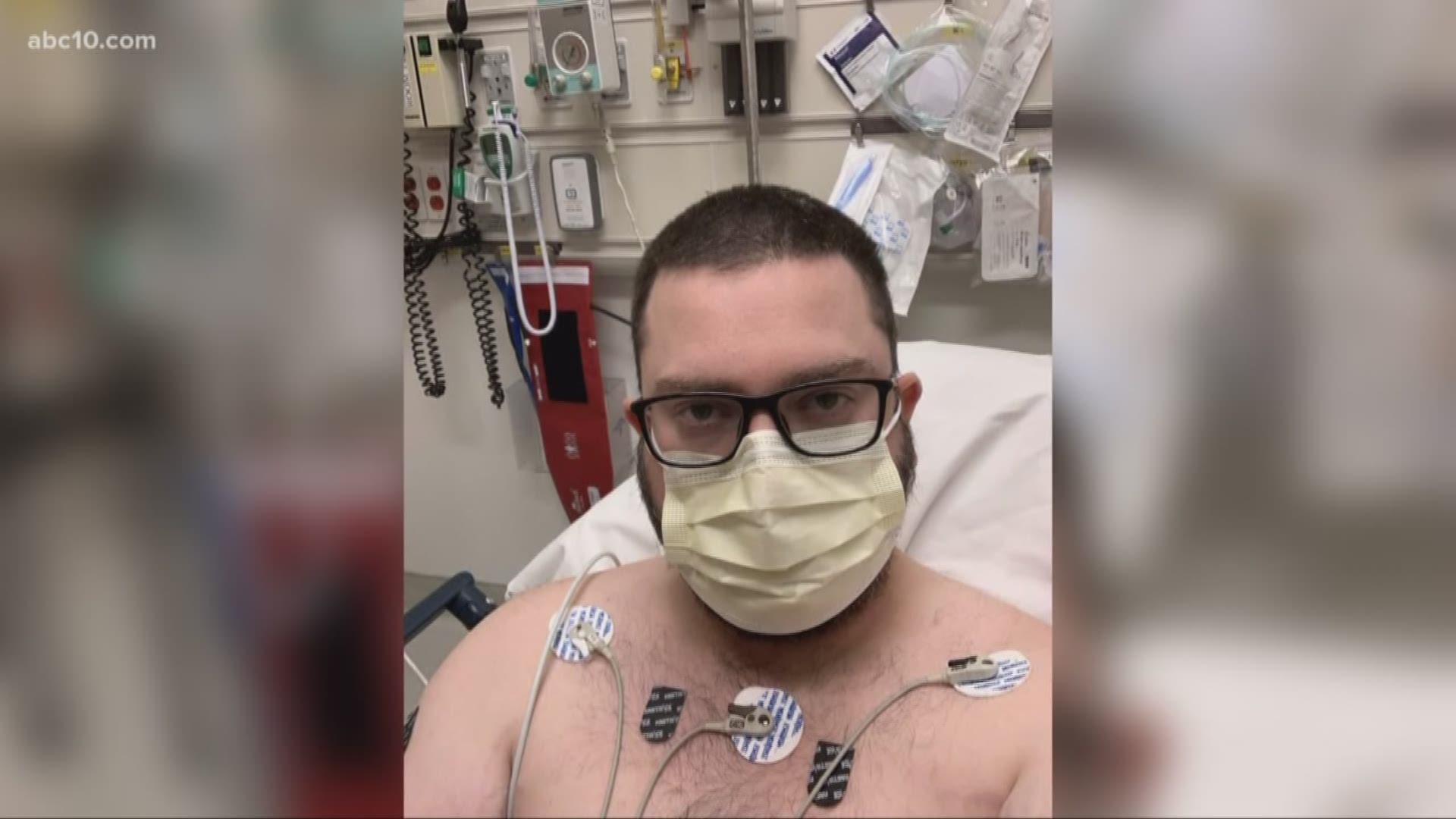RANCHO CORDOVA, Calif. — A Rancho Cordova man has taken to Twitter, warning people to take the coronavirus pandemic more seriously. Even though he wasn't given a test at the hospital, Jusin Wilhite believes he has coronavirus.
“Don’t sleep on this thing people,” Wilhite wrote on social media.
Wilhite, a 39 year-old Type I diabetic from Rancho Cordova, is currently quarantined with his family. Though he describes himself as “very healthy,” he writes the coronavirus has taken quite a toll on his health.
Feeding his followers’ curiosity, Wilhite details the progression of his symptoms in a Twitter thread. He says his symptoms started as early as two weeks ago.
“March 4th I began getting a headache and I could feel my lungs, which is weird,” Wilhite writes. “But everything is blooming so I chalked it up to allergies. My breathing became progressively more labored and began to hurt.”
RELATED CORONAVIRUS CONTENT:
As some doctors have pointed out, the initial symptoms of COVID-19 are similar to those of allergies and the common cold. This can make it difficult to self-diagnose the virus, which is why doctors are urging anyone who is sick to stay home, regardless of whether seasonal allergies are to blame.
Wilhite continued his Twitter thread noting he went to the Emergency Room after passing out and having difficulty breathing, but medical staff treated him for the flu, unaware that he was carrying coronavirus. However, he was simply not recovering, despite flu medication that doctors gave him and soon returned to the ER.
Wilhite did not get a coronavirus test administered. He told ABC10, doctors told him and his wife there is a lack of resources when it comes to the tests. He said his doctor believes he has the coronavirus.
Kaiser Permanente released this statement to ABC10 regarding their testing guidlines: "The health and safety of our patients, staff, and the community is our priority. Our physicians assess their patients and consult with them to determine the most appropriate plan of care based on the individual’s needs. In suspected COVID-19 cases, regardless of whether there is a positive test result, this can include the recommendation to self-isolate while receiving the appropriate level of care, to limit exposure to others.
At this time there continues to be limited capacity for COVID-19 testing among health care providers and our physicians follow CDC prioritization guidelines. Out of respect for patient privacy we cannot provide information about any individual case."
When describing his symptoms, Wilhite makes a particular note of pain in his lungs.
“Don’t think chest pain like a heart attack or flu,” Wilhite says. “This isn’t the flu. We all pretty much know the flu. Think deeper, think lung pain.”
By describing his symptoms, Wilhite has likely helped thousands of people understand that the coronavirus comes in many different forms. For instance, he does not have a fever, a common symptom for COVID-19 patients.
In the comments section of Justin’s thread, others are reporting similar symptoms. Kristen Enders, also a diabetic, writes that she has had symptoms for a few days. She, like many other Americans, is unsure whether to go to the ER at this point.
Wilhite replied, “I say go in.”
Coronavirus background
According to the CDC, coronavirus (COVID-19) is a family of viruses that is spreadable from person to person. Coronavirus is believed to have been first detected in a seafood market in Wuhan, China, in December 2019. If someone is sick with coronavirus, the symptoms they may show include mild to severe respiratory illness, cough, and difficulty breathing.
Currently, there is no vaccine; however, the CDC suggests the following precautions, along with any other respiratory illness:
Avoid close contact with people who are sick.
Avoid touching your eyes, nose, and mouth.
Stay home when you are sick.
Cover your cough or sneeze with a tissue, then throw the tissue in the trash.
Clean and disinfect frequently touched objects and surfaces using a regular household cleaning spray or wipe.
Wash your hands with soap and water for a minimum of 20 seconds.
WHY HEALTH OFFICIALS ARE SO CONCERNED
Some people have compared the low overall death toll to the flu's high annual death toll in the United States as a reason not to be concerned about COVID-19, however, doctors and health officials are concerned for three main reasons:
There's no vaccine yet and won't be one for until early 2021, at the soonest. Scientists are still researching what other medications could help patients.
Some people have built up immunity to the flu, but few have immunity to COVID-19 version of coronavirus.
Both the flu and COVID-19 are spread by droplets, but COVID-19 might be spread in the air. Scientists are researching exactly how COVID-19 spreads.
FOR NEWS IN YOUR COMMUNITY, DOWNLOAD THE ABC10 APP:
►Stay In the Know! Sign up now for ABC10's Daily Blend Newsletter
WATCH MORE:



